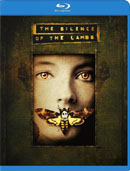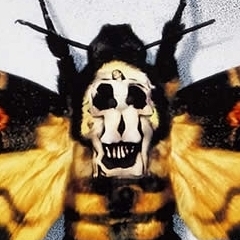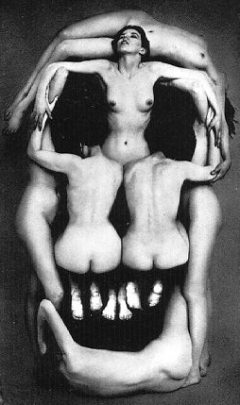
 Tagline: To enter the mind of a killer she must challenge the mind of a madman. Related Movies: • Manhunter (1986) [Blu-ray] • Silence of the Lambs (1991) [Blu-ray] • Hannibal (2001) • Red Dragon (2002) [Blu-ray] • Hannibal Rising (2007) One of the most shocking, compelling and diabolical crime thrillers ever made is even more delectable on Blu-ray! Including in-depth documentaries about the film's journey from page to screen, exclusive new interviews with Jodie Foster, Sir Anthony Hopkins and Scott Glenn in the feature-length Breaking The Silence, generous servings of deleted scenes, still photos and outtakes - and much more, this powerful, five-time Academy Award Winner will chill you to the bone. When FBI agent Clarice Starling (Foster) is assigned a case involving a monstrous serial killer, she seeks counsel from an imprisoned cannibalistic psychiatrist - Dr. Hannibal Lecter (Anthony Hopkins), whose fascination with the young women is as great as his hunger for murder. As their relationship develops, Starling must confront her own demons - and an evil so powerful that she may not have the courage or strength to stop it! Storyline: Young FBI agent Clarice Starling is assigned to help find a missing woman to save her from a psychopathic serial killer who skins his victims. Clarice attempts to gain a better insight into the twisted mind of the killer by talking to another psychopath Hannibal Lecter, who used to be a respected psychiatrist. FBI agent Jack Crawford believes that Lecter, who is also a very powerful and clever mind manipulator, has the answers to their questions and can help locate the killer. However, Clarice must first gain Lecter's confidence before the inmate will give away any information. Written by Sami Al-Taher Reviewer's Note: Reviewed by Martin Liebman on March 26, 2009 -- Believe me, you don't want Hannibal Lecter inside your head. Add one to the number of films now available on Blu-ray that boast of multiple Oscar wins, including Best Picture. The Silence of the Lambs not only swept the major categories at the 1991 Academy Awards, but it stands as one of the most deserving of all the Best Picture winners in the 81-year history of the Award. Earning a total of seven nominations and leaving with five statues, the film is something of an atypical major-category, multiple-Oscar winner in that it is a film heavily influenced by and containing many elements of true Horror filmmaking. The majority of Best Picture winners fall squarely into the Drama genre, and while The Silence of the Lambs does offer all the earmarks of a good Drama, there is no doubt that its dark atmosphere, terrifying characters, and grisly visuals dominate the film. While that sounds like it could describe most better-than-average Horror pictures, The Silence of the Lambs seals the deal with the plethora of A-list talent in front of, and behind, the camera, each delivering a Herculean effort that makes The Silence of the Lambs arguably the best Horror film of all time. FBI trainee Clarice Starling (Jodie Foster, Nim's Island) is given a big break when she is assigned to interview and construct a psycho-behavioral profile of the deranged killer, Hannibal "The Cannibal" Lecter (Anthony Hopkins, Nixon). Starling assumes correctly that her assignment is more than she is told, and she enters into a brief battle of wits with the clever and manipulative Lecter, who finally surrenders to her a clue that may lead her down a path towards catching the notorious killer "Buffalo Bill." When Bill kidnaps the daughter of a prominent U.S. Senator, Lecter's knowledge of the killer becomes central to the investigation. His budding rapport with Starling leads him to agree to a deal that may ease the harsh restrictions placed on him as one of the world's most infamous criminals in exchange for sharing his knowledge of the Buffalo Bill case, assuming the kidnapped girl is recovered alive. Based on the novel by Thomas Harris, The Silence of the Lambs is a story about a descent into hell, into both the deepest, darkest and most unforgiving crevices of both the Earth and of the human psyche. Hannibal Lecter is housed in a crude, unforgiving, windowless cell that offers roughly-textured stone walls, a filthy toilet, sink, and cot, and an impenetrable clear window that offers him no access to the outside world beyond his cage, the man denied even the bars that allow a criminal's hands and arms to experience brief moments of reprieve outside containment. Access to the cell is through rather plain and unassuming corridors and stairwells, until visitors are greeted by a harsh red light and a subtle yet foreboding rumble that signals the entrance into one of the world's most unforgiving prisons. Buffalo Bill's abode, like the hallways and staircases that lead to Lecter's cell, is ordinary and modest. Behind the pedestrian appointments of his living room and kitchen lies a labyrinthine, crude, musty, and inhospitable path towards both depravity and certain death, the grisly location ending at a deep, dark, and impossibly steep pit where the innocent await their deaths at the hands of a man as psychotic as perhaps any the world has ever known. Indeed, each locale suits its inhabitant and the themes of the film; Lecter and Bill are equally though differently deranged, Lecter in a smooth and almost unassuming intellectual fashion and Bill showing less physical control, his emotional make-up perhaps at odds with his deeper psychological and physical depravity. Each man lives in an Earthly representation of hell, and each man's mind, too, in their own unique way, exist almost in another plane of existence where reason, compassion, and morality no longer figure into the human condition. Director Jonathan Demme (The Manchurian Candidate) and Cinematographer Tak Fujimoto (The Sixth Sense) smartly frame The Silence of the Lambs around a plain, unassuming visual style that reinforces the themes of depravity and the superficial simplicity but deeper complexities of the story, Demme's direction earning him a Best Director Oscar. The film is consistently drab, visually, even on the surface and far away from either Lecter or Bill. Bleak, depressing, cold, and unforgiving, the film represents basic filmmaking at its best, conveying a simple story that is wonderfully disturbing, one that draws audiences into a world too frightening and stripped of humanity to endure first-hand, where only movie magic may suffice in leading audiences through a world so depraved as this. It's part escapist entertainment at its best, and part nightmare that is both horrific and riveting, one that is too finely constructed from which to warrant -- or desire -- interruption or reprieve. It takes audiences into a world that seems too grisly for most to comprehend, but does so both competently and assuredly, crafting along the way a tour into the darkest and most grotesque levels of humanity where cannibalism, murder, and the absence of even the most fundamental of human consciousness is absent. The Silence of the Lambs offers audiences a first-rate story directed with precision and chilling effectiveness, but it is the performance of its pair of lead actors that makes the film the unmitigated classic it is, and will continue to be, for generations to come. Hopkins' performance is rare, one of the finest in the history of motion pictures, his a complete transformation not physically but rather emotionally and psychologically, the actor exuding all the qualities of the Lecter character, those both admirable and despicable. Hannibal is a fascinating villain, a highly educated man with an impeccable memory and vocabulary, an uncanny ability to manipulate others, and able to fully read and understand other human being completely and precisely. From identifying their preferred brands skin cream and perfume to describing, in detail, the personal histories of others after only the briefest of encounters, Lecter may be one of the smartest and most refined men in the world, a man of exemplary taste with only the nasty habit of consuming his fellow man standing between him and greatness. Clarice Starling is the perfect match for him. She lacks his physical stature, experience, and unsurpassed sense of the world around him that Lecter feasts on when toying with his captors, but she is astute and insightful in her own right, and more so than most. She is willing -- and able -- to stand toe-to-toe with Lecter not necessarily intellectually but psychologically. Jodie Foster is astounding in this role, playing it perfectly as she lends a sense of shaky confidence to the part. As fine as her performance is, however, it is devoured by Hopkins' gargantuan and career-defining effort. Both Hopkins and Foster earned Academy Awards for their performances. The Silence of the Lambs represents filmmaking and all that encompasses -- storytelling, acting, direction, pace, and thematic importance and structure, to name a few -- at its pinnacle. The film is a classic in the truest sense of the word, a picture that remains as intriguing, frightening, and compelling as ever thanks to its virtually flawless presentation, made possible by the contributions of top talent performing at their very best. MGM's Blu-ray release is a good one, but by no means a perfect one. The disc features an adequate video transfer that bests previous iterations of the film but fails to truly surpass them, though considering the film's inherent style, the transfer seen here seems a fine representation of the film's calculated appearance. Likewise, the soundtrack is sufficient but not stellar, though again, it seems in-line with the intended presentation. Finally, the disc is supported by a fine selection of bonus materials. Although the visuals and the accompanying soundtrack won't wow any Blu-ray viewers -- those both new to the format and those with several hundred titles under their belts -- the strength of the film and its place in cinematic history makes this disc a must-own. Highly recommended. Trivia:
Cast Notes: Jodie Foster (Clarice Starling), Anthony Hopkins (Dr. Hannibal Lecter), Scott Glenn (Jack Crawford), Anthony Heald (Dr. Frederick Chilton), Ted Levine (Jame 'Buffalo Bill' Gumb), Frankie Faison (Barney Matthews), Kasi Lemmons (Ardelia Mapp), Brooke Smith (Catherine Martin), Paul Lazar (Pilcher), Dan Butler (Roden), Lawrence T. Wrentz (Agent Burroughs), Don Brockett (Friendly Psychopath in Cell), Frank Seals Jr. (Brooding Psychopath in Cell), Stuart Rudin (Miggs), Maria Skorobogatov (Young Clarice Starling [as Masha Skorobogatov]). IMDb Rating (02/16/18): 8.6/10 from 1,020,517 users Top 250: #23
 | ||||||||||||||||||||||||||||||||||||||||||||||



